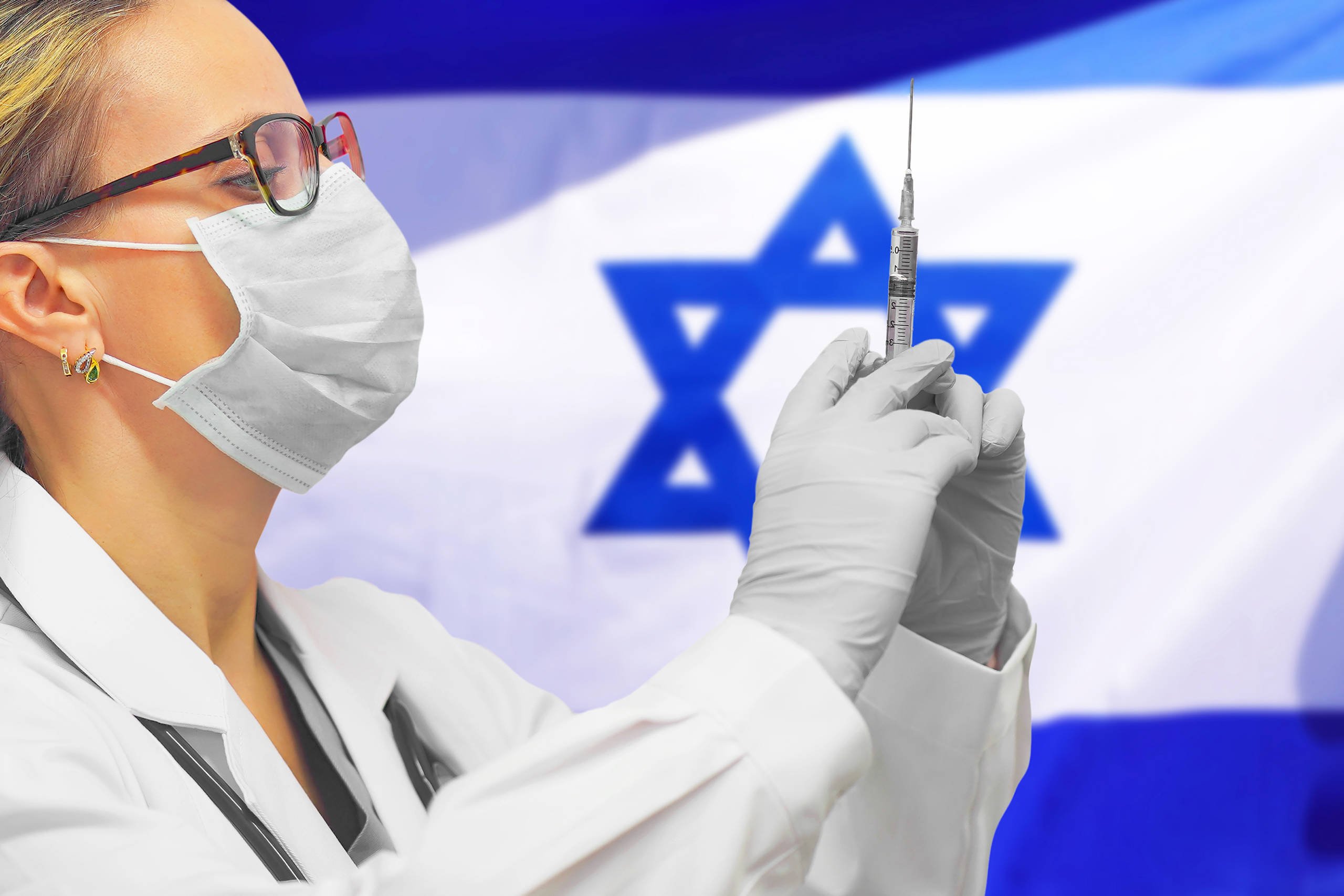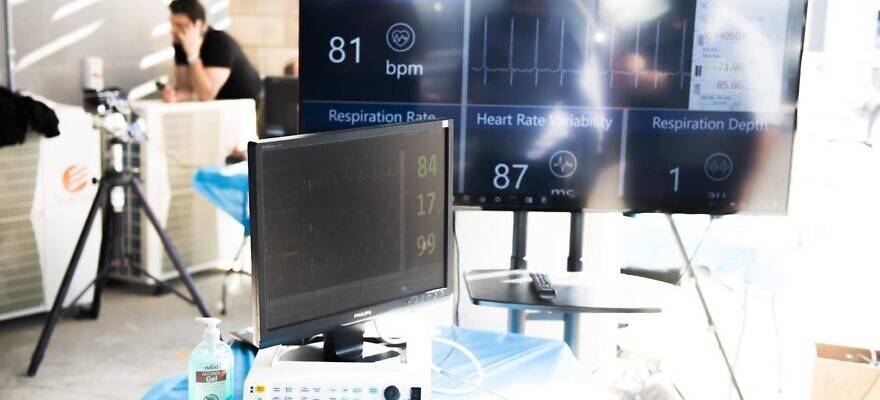“Thanks to creative thinking [we’re] using technology that is normally used against enemies … to win in the fight against COVID-19,” said Dr. Yossi Shaya, of the Beilinson Hospital.
By Yaakov Lappin, JNS
Two major Israeli defense companies have developed cutting-edge coronavirus symptom detectors that will allow doctors to remotely pick up on suspicious symptoms indicative of COVID-19. The sensors were created by adapting radar and camera technology that come from the defense and homeland security world.
The program, initiated by the Defense Ministry’s Directorate of Defense Research and Development, has seen Israel Aerospace Industries (IAI) and Elbit Systems rapidly take radars and elecro-optic (camera) sensors and convert them into highly sensitive sensors that will enable medical teams to screen patients from another room, thereby greatly enhancing their safety.
In recent days, the Defense Ministry announced that its National Emergency Team, together with IAI and Elbit, have developed the prototypes to measure the vital signs of patients, including pulse, respiratory rate and temperature, to pick out patterns that indicate a likely coronavirus infection.
“I don’t know of any adaption of defense technology or homeland security radars for this purpose until now,” said Yossi Cohen, vice president and chief technological officer at Elbit Systems’ C4i and Cyber Division. “Until now, the civilian world didn’t have this need.”
Now, however, and likely in the near future, there will be a dramatic need for remote sensing that protects medical personnel from the risk of infection.
“This development came as a result of a capability that we want to give doctors at the entrance to Emergency Rooms to distinguish [between] patients that have a respiratory and have a chance of [contracting] coronavirus from patients suffering from other patients,” said Cohen.
Currently, medical teams have to examine patients directly through close contact and at longer intervals, putting them in danger of infection. The remote-sensing solutions give doctors the ability to check patients from more than two meters away or even from another room by viewing the results on a screen.
Once they receive the signs, said Cohen, the doctors can decide whether more comprehensive checks are needed, and if so, to move the patient to a more sterile area with the appropriate protective gear to continue the care. “This is a very important requirement,” he said.
Working with the Defense Ministry’s DDR&D and the Rabin Medical Center in Petach Tikvah, Elbit will deliver its first prototype to that hospital before examining ways to expand its program, including installing machines at drive-through test facilities and at the entrances to military bases.
The system is based on radar technology that “allows us to identify, in a very precise manner, small changes,” said Cohen.
This ability was modified to allow the radar to detect minute body movements created by the pulse and breath, and measure patterns. The system can even scan for the ratio of inhalations and exhalations, allowing for conclusions to be drawn about the likelihood of a respiratory disease like coronavirus to be involved. The second component of the machine, an advanced thermal camera, can take a highly precise temperature reading and employs advanced algorithms to achieve that precision, said Cohen.
Two successful trials of the prototype have been completed. Elbit is now looking at ways to use artificial intelligence to allow doctors to generate automatic insights based on the readings. “We can let the networks produce insights,” said Cohen. The system will be installed at the Beilinson Hospital in the Rabin Medical Center as of Monday, and doctors will be able to run it without any outside help, as they build up experience in using the sensor.
‘Built to Detect Slow, Small Movements’
Meanwhile, IAI has also developed its own prototype using a radar originally designed to protect perimeters and detect people walking or crawling, or vehicles moving. “We took the smallest of our radars and place the ability to measure pulse and breath rates on it,” said Israel Lupa, executive vice president and chief technological officer of Elta, a division if IAI.
The radar uses a very low frequency, meaning that it is safe to use in close proximity to people, he stressed. “A radar of this type was built to detect slow, small movements,” said Lupa. “The system can already detect minor movements. We adapted this to tracking body movements caused by the breath and pulse.”
Within seconds, the system, which also includes an advanced thermal camera for detecting fever, can deliver an alert (though not a final diagnosis) to medical teams of an indication of a possible COVID-19 patient.
The initiative was launched by the Defense Ministry’s National Emergency Team, which is led by DDR&D Director, Brig. Gen. (Res.) Dr. Dani Gold, who was instrumental in the past in setting up Israel’s Iron Dome air-defense system.
“The combination of the technological capabilities of the defense industries and the extraordinary capabilities of the officers in the DDR&D enable us to adapt systems developed for security purposes to fulfill medical needs in light of the coronavirus,” said Col. A, of the DDR&D.
Dr. Yossi Shaya, of the Beilinson Hospital, stated that “the DDR&D turned to us with the idea of monitoring patients using radar. These are systems that we don’t normally work with, but they asked us what our needs are in the hope that these systems may be adapted to fulfill them. They asked what vital signs should be monitored among corona patients at the point of diagnosis and during treatment—and aimed to do so without the involvement of medical staff.
“The idea is that our medical teams are at the forefront of this fight and should be protected,” he continued, “and the way to do so is to reduce direct contact with corona patients. Thanks to the creative thinking of the DDR&D—of using technology that is normally used against enemies—I hope we will be able to win in the fight against the COVID-19 virus.”

HELP ISRAELIS BATTLE CORONA!
Donate to the Corona Emergency Relief Fund. Coronavirus has taken a huge toll on the people of Israel. The poor, elderly and ill are most vulnerable.
Israeli soldiers, security officers and medical care providers operate under great danger and risk to life.
Over 1 million Israelis are out of work. Many cannot make ends meet. We provide financial aid, food, medical supplies and more. Funds are distributed where needed most. The time to act is now!
United with Israel extends a special note of appreciation to the Genesis Prize for their generous support.


